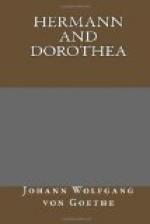Thus she spoke, and the broad stone steps meanwhile
had descended
With her companion beside her, and on the low wall
of the fountain
Both sat them down. She bent herself over to
draw, and he also
Took in his hand the jar that remained, and bent himself
over,
And in the blue of the heavens, they, seeing their
image reflected,
Friendly greetings and nods exchanged in the quivering
mirror.
“Give me to drink,” the youth thereupon
in his gladness petitioned,
And she handed the pitcher. Familiarly sat they
and rested,
Both leaning over their jars, till she presently asked
her companion:
“Tell me, why I find thee here, and without
thy horses and wagon,
Far from the place where I met thee at first? how
camest thou hither?”
Thoughtful he bent his eyes on the ground, then quietly
raised them
Up to her face, and, meeting with frankness the gaze
of the maiden,
Felt himself solaced and stilled. But then impossible
was it,
That he of love should speak; her eye told not of
affection,
Only of clear understanding, requiring intelligent
answer.
And he composed himself quickly, and cordially said
to the maiden:
Hearken to me, my child, and let me reply to thy question.
’Twas for thy sake that hither I came; why seek
to conceal it?
Know I live happy at home with both my affectionate
parents,
Faithfully giving my aid their house and estates in
directing,
Being an only son, and because our affairs are extensive.
Mine is the charge of the farm; my father bears rule
in the household;
While the presiding spirit of all is the diligent
mother.
But thine experience doubtless has taught thee how
grievously servants,
Now through deceit, and now through their carelessness,
harass the mistress,
Forcing her ever to change and replace one fault with
another.
Long for that reason my mother has wished for a maid
in the household,
Who not with hand alone, but with heart, too, will
lend her assistance,
Taking the daughter’s place, whom, alas! she
was early deprived of.
How when to-day by the wagon I saw thee, so ready
and cheerful,
Witnessed the strength of thine arms, and thy limbs
of such healthful proportion,
When thy intelligent speech I heard, I was smitten
with wonder.
Hastening homeward, I there to my parents and neighbors
the stranger
Praised as she well deserved. But I now am come
hither to tell thee
What is their wish as mine.—Forgive me
my stammering language.”
“Hesitate not,” she, answering, said,
“to tell me what follows.
Thou dost not give me offence; I have listened with
gratitude to thee:
Speak it out honestly therefore; the sound of it will
not alarm me.
Thou wouldst engage me as servant to wait on thy father
and mother,
And to look after the welt-ordered house of which
ye are the owners;
And thou thinkest in me to find them a capable servant,
One who is skilled in her work, and not of a rude




